Progressive Men of Iowa
1899
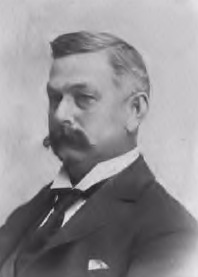 PATTERSON,
John W., was born on his father's farm in Perry
township, Ashland county, Ohio, June 3, 1847.
His father, William Patterson, lives with two
unmarried daughters at Waterloo, Ind. His father
was also a merchant for many years after leaving
the farm. His wife was Elizabeth Shaeffer, whose
father served his country in the war of the
American revolution. PATTERSON,
John W., was born on his father's farm in Perry
township, Ashland county, Ohio, June 3, 1847.
His father, William Patterson, lives with two
unmarried daughters at Waterloo, Ind. His father
was also a merchant for many years after leaving
the farm. His wife was Elizabeth Shaeffer, whose
father served his country in the war of the
American revolution.
While a boy John W. helped
his father on the farm, attending the public
school in the winter months until he was 17
years old. In September, 1862, at the age of 15,
he answered the call of Governor Todd, of Ohio,
for the minute men of the state to go to the
defense of Cincinnati, then being threatened by
the confederates. Every man furnished his own
arms and ammunition. The troops thus assembled,
after serving in the intrenchments and
fortifications of the city for ten days, were
honorably discharged, and are known in Ohio's
history of the war as " The Squirrel
Hunters. He was too
young to enter the army at the beginning of the
war of the rebellion, but when he reached the
age of 17, in 1864, he enlisted in the One
Hundred and Seventy sixth Ohio Volunteer
infantry, commanded by Col. E. C. Mason. The
regiment was assigned to the army of the
Cumberland, which was then at Nashville, Tenn.
He was in the great battle of the 15th and 16th
of December, 1864, in which General Thomas won a
great victory over the rebel army, under General
Hood. Mr. Patterson
acted as quartermaster of the regiment during
the larger part of his term of service.
After being mustered out,
Mr. Patterson
secured a position as a clerk in a grocery. He
came to Iowa in the fall of 1881 and engaged in
the retail dry goods business in Marion, Linn
county. For many years he has been a commercial
traveler. His first vote was cast for Abraham
Lincoln for president in 1864, and he has always
been an active republican since. He has been a
member of a campaign glee club in nearly every
political campaign since the close of the war.
He has often been a delegate to county,
congressional and state conventions of the
republican party, and has served as chairman of
Linn county republican central committee for
four years. He was assistant sergeant-at-arms at
the St. Louis republican national convention
which nominated McKinley for president. He is a
member of the Masonic order, a Shriner, and a
member of the Knights of Pythias, and of Post
No. 204 of the Grand Army of the Republic at
Marion. January 5,
1898, Mr. Patterson was appointed collector of
internal revenue for the Third district of Iowa,
and entered upon his duties February 7,
1898. January 12,
1870, he was married to Miss Ella Howell, of
Danby, N. Y. They have had five children, three
of whom are living: Ida H., Clarence H., and
Walter J.
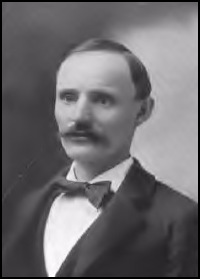 RICHARDSON,
Napoleon B., of Coggon, Linn county, is a
prosperous banker of that town. His father,
Aaron Richardson, came to Iowa in 1855, settling
on a farm in Delaware county. His wife's maiden
name was Maria E. Belding. Their son, Napoleon,
was born July 6, 1857, in a small log house
containing but one room, on the farm in Union
township, and spent his boyhood there. RICHARDSON,
Napoleon B., of Coggon, Linn county, is a
prosperous banker of that town. His father,
Aaron Richardson, came to Iowa in 1855, settling
on a farm in Delaware county. His wife's maiden
name was Maria E. Belding. Their son, Napoleon,
was born July 6, 1857, in a small log house
containing but one room, on the farm in Union
township, and spent his boyhood there.
His early education was
begun in the common schools and as he grew up,
he took a course in Lenox college in Hopkinton,
and graduated from Baylies Business college in
Dubuque in September, 1877. From boyhood he had
been industrious and economical, saving his
earnings. His first business venture was in a
creamery which he carried on from June, 1881,
with success. He developed fine business ability
and so invested his earnings as to bring a good
interest.
In 1892 he took a
subordinate position in a bank for the purpose
of getting a thorough knowledge of the
business. He worked as
a clerk for about a year, developing a capacity
for successful banking, so that before the year
had expired he was promoted to cashier of the
bank, a position which he continues to
hold. March 21,
1883, he was married to Miss Flora J. McBride.
Three children have been born to them, of which
the oldest, Winifred, died in infancy. Florence
M. was born July
25, 1891, and Anna, October 18, 1897.
Mr. Richardson has always
been a republican and is not a member of any
church. He has been successful in business and
enjoys the confidence of the community in which
he lives.
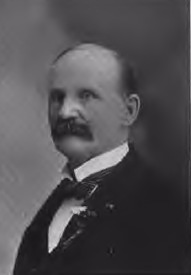 RICKEL,
Henry, of Cedar Rapids, was born in Richland
county, Ohio, August 16, 1835. His father,
Samuel Rickel, was of German descent and was
born in Bedford county, Penn. Several members of
his family were in the revolutionary war, and an
uncle was killed at the battle of Brandywine.
His more remote ancestors came from
Frankfort-on-Main, where many of the same name
are now living. He was a cabinet maker, and in
1829 removed to Richland county, Ohio. He
married Barbara Smith, who was of German and
English descent, and whose father, Henry F.
Smith, was a soldier in the war of 1812. Samuel
Rickel and his family moved in 1839 to
Springfield, 111.; from there to Galena, and in
1849 to Clayton county, Iowa. RICKEL,
Henry, of Cedar Rapids, was born in Richland
county, Ohio, August 16, 1835. His father,
Samuel Rickel, was of German descent and was
born in Bedford county, Penn. Several members of
his family were in the revolutionary war, and an
uncle was killed at the battle of Brandywine.
His more remote ancestors came from
Frankfort-on-Main, where many of the same name
are now living. He was a cabinet maker, and in
1829 removed to Richland county, Ohio. He
married Barbara Smith, who was of German and
English descent, and whose father, Henry F.
Smith, was a soldier in the war of 1812. Samuel
Rickel and his family moved in 1839 to
Springfield, 111.; from there to Galena, and in
1849 to Clayton county, Iowa.
Henry Rickel's education
was commenced in a log schoolhouse in Illinois,
and completed in the schools of West Union,
Iowa. He learned the cabinet-making trade and
worked at that until about 21 years old. After
that he engaged in the book and stationery
business at McGregor and at West Union, Iowa,
under the firm name of Rickel & Huffman,
until 1860, when he commenced the study of law
with Hon. L. L. Ainsworth, of West Union. In
September, 1862, he assisted in raising Company
C, of the Sixth Iowa cavalry, and served with
that regiment until June, 1864, when he was
compelled by ill health to resign. Captain
Ainsworth commanded the company and Mr. Rickel
was second lieutenant. The regiment was engaged
in frontier service, under Gen. Alfred Sully.
Before enlisting he assisted in raising five
other companies in Fayette county.
In 1866 Mr. Rickel formed a
law partnership with Hon. William McClintock, of
West Union, which continued for a number of
years. He was also connected in the law business
with Hon. William E. Fuller and D. W. Clements,
of the same place. Later he was a partner of
Hon. W. V. Allen, now United States senator from
Nebraska. In 1878 he removed to Cedar Rapids,
and became a member of the firm of Rickel, West
& Eastman. For the past twelve years he has
been a member of the firm of Rickel &
Crocker.
Politically, Henry Rickel
is a republican and his first vote was cast for
John C. Fremont, but from 1863 to 1874 he voted
with the democratic party. He then voted for
Hayes for president, and since that time has
usually voted the republican ticket. He was for
several years' mayor of the city of West Union,
and was a member of the house of representatives
from Fayette county during the session of the
Seventeenth General Assembly.
He was married October 14,
1857, to Susan Brown, of West
Union, who was born in Yates county, N. Y. They
have had two children, Willie, who died at the
age of 11 years, and Lillian M., who is the wife
of Alfred H. Newman, of Cedar Rapids. Mr. Rickel
is a member of the Methodist church, and belongs
to the Odd Fellows. For many years he has been
active in promoting temperance reform in Iowa,
and took a leading part in the enactment and
enforcement of the prohibitory law, delivering
many lectures in northern Iowa.
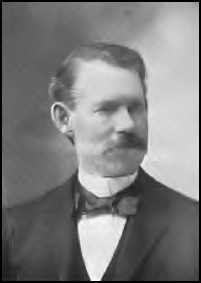 ROBINSON,
John Blair, a prominent physician and surgeon of
Mt. Vernon, has won a high place in the practice
of his profession. He was born May 29, 1852, in
Knoxville, Marshall county, W. Va., in the same
log cabin in which his father was born and
brought up, and where his grandparents died. The
house which has sheltered three generations of
the Robinson family still stands. Dr. Robinson
was the son of James Robinson, who was a farmer
in good circumstances. He served three years in
the union army as a private in Company B,
Twelfth West Virginia volunteers. He was
accidentally killed on Sep-tember 9, 1886, his
57th birthday. His mother, whose maiden name was
Sarah Ann Harris, whose ancestors came from
Connecticut, was born and still lives in West
Virginia. Several of her ancestors served in the
revolutionary war. And that they were ardent
supporters of the union is attested by the fact
that thirty-seven of her, and her husband's
relatives offered their lives in the defense of
their country during the war of the
rebellion. The Terrills,
a branch of her family, were instrumental in
establishing the first Universalist church in
West Virginia, and were Uncompromising
abolitionists, and noted for opposition to
intemperance and capital punishment. The family
is of Scotch and Irish descent, and in America
has representatives through five to seven
generations. ROBINSON,
John Blair, a prominent physician and surgeon of
Mt. Vernon, has won a high place in the practice
of his profession. He was born May 29, 1852, in
Knoxville, Marshall county, W. Va., in the same
log cabin in which his father was born and
brought up, and where his grandparents died. The
house which has sheltered three generations of
the Robinson family still stands. Dr. Robinson
was the son of James Robinson, who was a farmer
in good circumstances. He served three years in
the union army as a private in Company B,
Twelfth West Virginia volunteers. He was
accidentally killed on Sep-tember 9, 1886, his
57th birthday. His mother, whose maiden name was
Sarah Ann Harris, whose ancestors came from
Connecticut, was born and still lives in West
Virginia. Several of her ancestors served in the
revolutionary war. And that they were ardent
supporters of the union is attested by the fact
that thirty-seven of her, and her husband's
relatives offered their lives in the defense of
their country during the war of the
rebellion. The Terrills,
a branch of her family, were instrumental in
establishing the first Universalist church in
West Virginia, and were Uncompromising
abolitionists, and noted for opposition to
intemperance and capital punishment. The family
is of Scotch and Irish descent, and in America
has representatives through five to seven
generations.
Dr. Robinson was the eldest
of thirteen children, and early in life learned
the les-son of self-reliance and helpfulness to
others. He began when only 7 years of age to
perform many kinds of farm work, and thus in
advancing years found his field of operations
rapidly increasing. In 1858 he began attending a
subscription school in a log house. He never saw
a free public school until he was 15 years of
age. In 1872 he
took a five-months' course in the Meadville
academy at French Creek, W. Va. He attended the
Waynesburg college, Waynesburg, Pa., during the
years of 1873-4-5, completing the sophmore year.
He taught in the public schools of West Virginia
for a period of thirty-two months. In 1876 he
began reading medicine in Wheeling, W. Va.,
under Dr. C. C. Olmstead, who
is now a resident of Milwaukee, Wis. In 1877-8
he attended medical lectures in Cincinnati,
Ohio, in the Pulte Medical college, and at
Hahnemann Medical college, Chicago, graduating
from the latter in 1879. The next year he came
west to Iowa, locating at Mt. Vernon, where he
began the practice of medicine with less than
$100 in cash, and was in debt more than $500 to
kind friends in the east, which required six
years to pay in addition to keeping up his
business expenses and supporting his family. By
strict attention to business he soon acquired a
lucrative practice.
In 1883 he formed a
partnership with Dr. Joshua Doron in the
practice of medicine, and conducted a drug store
at Mt. Vernon, which continued until the
partnership was mutually dissolved. He did this
in order to devote all of his time to the
practice of medicine, and his work has been
since that time confined to that of a general
practitioner. That he has been successful is
attested by constantly increasing practice,
which has run throughout a course of nineteen
years. When the war
broke out he was too young to shoulder a musket,
but for two or three years he carried the mail
on horseback for the soldiers' families in the
neighborhood, two or three times a week, from
the nearest railroad station, a distance of five
miles.
Dr. Robinson has always
been a republican, and has frequently served as
a dele gate to county, congressional and state
conventions. He has never been a candidate for
any political preferment. He is now, and has
been for several years, chairman of the Mt.
Vernon school board, and served six consecutive
years as a member of the city council. He has
for several years held the position of physician
to the Mt. Vernon board of health. He is a
member of the Iowa Legion of Honor, Modern
Woodmen of America, Knights of Pythias,
Independent Order of Odd Fellows, and the Modern
Brotherhood of America, in all of which he
holds, or has held, important offices, and is a
member of the grand lodge of Knights of Pythias
of Iowa. He is a member of the Methodist
Episcopal church, and holds official positions
therein.
He was married September
28,1878, at Moundsville, W. Va., to Sarah E.
Howe, a daughter of Rev. Wm. R. Howe. They have
two children: Nellie Howe, born October 8, 1880,
and James Arthur, born December 25, 1883.
February 7, 1893, Mrs. Robinson died. He was
again married, October 2, 1895, to Anna Coldren
Shepler, a daughter of Samuel and Elizabeth
Shepler, of Belle Vernon,
Pa.
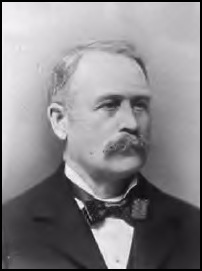 SMITH,
Jesse Hitchcock, president of the Farmers
Insurance company, of Cedar Rapids, is a native
of Indiana. His father was Isaac Smith, a
substantial farmer, living in Elkhart county.
His mother's maiden name was Sarah Thomas. SMITH,
Jesse Hitchcock, president of the Farmers
Insurance company, of Cedar Rapids, is a native
of Indiana. His father was Isaac Smith, a
substantial farmer, living in Elkhart county.
His mother's maiden name was Sarah Thomas.
The son, Jesse, was born on
the 27th of August, 1838, and was brought up on
the farm, working during the summer months, and
attending district school in the winter. In the summer
of 1853 the family moved to Iowa and again
settled on a farm in the then new state,
locating on the fertile prairie land of Linn
county. Here for many years Jesse assisted his
father in breaking up wild prairie, building
fence, plowing, sowing, planting and reaping,
performing all the varied labor pertaining to
farm life in a new country, before barbed wire
and twine binders had so greatly lightened the
tedious and exhausting labor of fencing the
farms and harvesting the small grain, then so
extensively grown.
In the winter he again
attended the district school, kept in a rude log
house meagerly equipped for educational
progress. But Jesse was studious and prepared
himself to enter the first class organized in
Western college, when that institution was
established, not far from his father's
home. Here he got a
good education and soon after studied medicine
in Cedar Rapids. He became a
practicing physician in that city and for
fifteen years devoted his time to that
profession, almost exclusively.
In the fall of 1887 Dr.
Smith was nominated by the republicans for
senator in the Twenty-second General Assembly,
and elected for the term of four years, serving
with ability and fidelity. He has always been an
active and ardent republican, casting his first
vote for Abraham Lincoln for president in I860.
He has served four terms as mayor of Cedar
Rapids and for ten years has been president of
St. Luke's hospital in that city. He owns a
stock farm south of the city, where he has for
many years given attention to stock
raising. But Dr. Smith
is more widely known as president of the Farmers
Insurance company, of Cedar Rapids, a position
which he has held continuously since the 1st of
January, 1869.
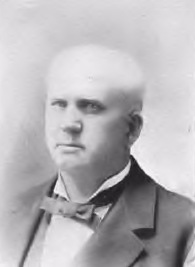 SMITH,
William M., of Mount Vernon, is a native of
Ohio. He was born in Penn township, Morgan
county, May 29, 1848. His father,
James Smith, was born in Belmont county, Ohio,
March 16, 1826, and with his parents, Thomas and
Nancy Smith, moved to Morgan county, Ohio, when
a mere boy. James Smith's grandfather, Samuel
Smith, was one of the early settlers of Ohio,
and removed from his native state, Virginia,
before Ohio had been admitted to the union. He
located in Columbiana county and married Sarah
Bishop. James Smith
was married to Ruth King April 27, 1847. Mrs.
Smith was a native of Morgan county, Ohio, and a
daughter of Joseph and Mary Morris King. Three
children were born to them: William M., Caroline
N. and Charles T., all living. Mr. and Mrs.
James Smith were members of the Society of
Friends. They resided in Pennsville until 1865,
and in September of that year removed to Iowa,
and into Mount Vernon in 1873, where they now
reside. Mr. Smith has held the office of mayor
of Mount Vernon for four terms. William M.
Smith's childhood was spent in Penns-ville, and
he received his education in the common schools
of that place. In his fifteenth year, he
enlisted as a volunteer for three years' service
in the union army. Owing to his extreme youth,
he met with much opposition from his parents to
joining the army. He enlisted at Marietta, Ohio,
in Company E, Seventy-eighth O. V. I., in
February, Joined his regiment at Vicksburg,
Miss., in March, 1864, and stood his first
picket guard at Black River Bridge. In April he
came up the Mississippi river to Cairo, 111.,
and there met the regiment returning from
veteran furlough. They waited there but a short
time and then went by transport up the Ohio
river to Paducah, Ky., and thence up the
Tennessee river to Clifton, Tenn. At Clifton
they disembarked and started on the march for
Huntsville, Ala, then started to join Sherman
and met his command at Big Shanty, Ga. He was
engaged with his regiment in all the principal
battles from that time, including Keneeaw
Mountain and that of Atlanta, which was fought
July 22, 1864. SMITH,
William M., of Mount Vernon, is a native of
Ohio. He was born in Penn township, Morgan
county, May 29, 1848. His father,
James Smith, was born in Belmont county, Ohio,
March 16, 1826, and with his parents, Thomas and
Nancy Smith, moved to Morgan county, Ohio, when
a mere boy. James Smith's grandfather, Samuel
Smith, was one of the early settlers of Ohio,
and removed from his native state, Virginia,
before Ohio had been admitted to the union. He
located in Columbiana county and married Sarah
Bishop. James Smith
was married to Ruth King April 27, 1847. Mrs.
Smith was a native of Morgan county, Ohio, and a
daughter of Joseph and Mary Morris King. Three
children were born to them: William M., Caroline
N. and Charles T., all living. Mr. and Mrs.
James Smith were members of the Society of
Friends. They resided in Pennsville until 1865,
and in September of that year removed to Iowa,
and into Mount Vernon in 1873, where they now
reside. Mr. Smith has held the office of mayor
of Mount Vernon for four terms. William M.
Smith's childhood was spent in Penns-ville, and
he received his education in the common schools
of that place. In his fifteenth year, he
enlisted as a volunteer for three years' service
in the union army. Owing to his extreme youth,
he met with much opposition from his parents to
joining the army. He enlisted at Marietta, Ohio,
in Company E, Seventy-eighth O. V. I., in
February, Joined his regiment at Vicksburg,
Miss., in March, 1864, and stood his first
picket guard at Black River Bridge. In April he
came up the Mississippi river to Cairo, 111.,
and there met the regiment returning from
veteran furlough. They waited there but a short
time and then went by transport up the Ohio
river to Paducah, Ky., and thence up the
Tennessee river to Clifton, Tenn. At Clifton
they disembarked and started on the march for
Huntsville, Ala, then started to join Sherman
and met his command at Big Shanty, Ga. He was
engaged with his regiment in all the principal
battles from that time, including Keneeaw
Mountain and that of Atlanta, which was fought
July 22, 1864.
In this battle he received
two gunshot wounds and lay upon the battlefield
many hours before being cared for, and after he
was found he was compelled to remain two days in
the rear before his wounds could be dressed. He
was taken, in a wagon, to Marietta and placed in
the old military academy, where General Sherman
once taught military tactics, at that time used
as a hospital. After a few
days he was removed to Rome, Ga., where he
remained in the field hospital until the latter
part of September. Unable to walk and almost
destitute of clothing, he started home on
furlough, arriving at his destination about
October 1st his wounds and subsequent suffering
unfitted him for further service in the field,
consequently he was honorably discharged at
Louisville, Ky., in June, 1865. He still carries
an ounce ball in his left hip.
Mr. Smith came west with
his parents in the fall of 1865, and stopped
that winter near Springville, Linn county, Iowa.
In March, 1866, the family moved to Tama City,
Tama county, and Mr. Smith made that his home
for six years. He then returned to Ohio and in
September, 1872, engaged with Drs. Jennings and
Kessler, West Milton, Ohio (Miami county), to
manage their drug store, until they sold out the
following spring. He was afterwards engaged as a
traveling salesman for E. F. Rinehart, wholesale
and manufacturing druggist of Troy, Ohio. He
traveled for this house five years, selling
goods in Ohio, Indiana and Michigan. In 1878 he
pursued the same business for Dr. Cary, of
Zanesville, Ohio, traveling in Iowa, Wisconsin,
Indiana and Michigan, until the fall of 1879,
when he purchased stock in the Rinehart Medicine
company and remained with that company until
1883, when he disposed of his interest and came
to Mount Vernon. In 1884 he entered into
partnership with Dr. James Carson, opening a
bank, which he has managed ever since that time.
The business has been steadily successful, and
February 1, 1893, Col. H. H. Rood purchased
one-third interest. The bank was conducted under
this management until February 1, 1897, when Dr.
Carson sold his interest to W. C. Stuckslager,
of Lisbon, and retired from the banking
business. At this time the capital was increased
to $50,000. During the period of the bank's
existence, so conservative has been the
management of Mr. Smith as cashier, that not a
dollar of its loans and investments has been
lost. He also owns
and manages a farm adjoining the city, on which
he has a fine registered herd of Aberdeen Angus
cattle of the best families.
Mr. Smith has been a
life-long republican. He is a member of Mount
Vernon Lodge No. 112, A. F. and A. M., Ashler
Chapter No. 122, R. A. M., and W. C. Dimmitt
Post No. 400, G. A. R.
He was married to Miss
Clara A. Brackett, September 9, 1884. Mrs. Smith
is a native of Putnam township, was reared in
Mount Vernon, and is a daughter of William and
Elizabeth Sherman Brackett She is a graduate of
Cornell Conservatory of Music, and was for some
time a teacher in that institution. They have
had two children: William Edgar, born January
19, 1891, who died in his third year, and Ruth
Elizabeth, born December 29,
1893.
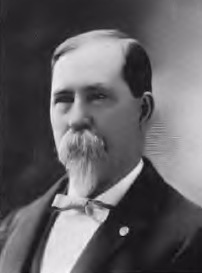 STEWART,
James Orbison, of Cedar Rapids, is of
Scotch-Irish descent and is a native of Mercer
county, Penn., having been born near North
Liberty, in that state, October 3, 1837. His
father, John Stewart and family, moved to
Washington, Iowa, in 1844. His mother's maiden
name was Wadell. Her father, who was of Scotch
descent, was a soldier in the war of 1812. James was
only 7 years old when the family moved to Iowa,
and to him at that age it was the event of a
lifetime. This was long before the day of
railroads and the trip was made by water from
Allegheny City, Penn., to Keokuk, Iowa. Wagons
and horses were brought along to make the
balance of the distance. In 1850 the family
moved in the same primitive fashion to Cedar
Rapids, which was then but a small village. The
country was very sparsely settled and the family
endured all the hardships and vicissitudes
incident to early pioneer life in the west. STEWART,
James Orbison, of Cedar Rapids, is of
Scotch-Irish descent and is a native of Mercer
county, Penn., having been born near North
Liberty, in that state, October 3, 1837. His
father, John Stewart and family, moved to
Washington, Iowa, in 1844. His mother's maiden
name was Wadell. Her father, who was of Scotch
descent, was a soldier in the war of 1812. James was
only 7 years old when the family moved to Iowa,
and to him at that age it was the event of a
lifetime. This was long before the day of
railroads and the trip was made by water from
Allegheny City, Penn., to Keokuk, Iowa. Wagons
and horses were brought along to make the
balance of the distance. In 1850 the family
moved in the same primitive fashion to Cedar
Rapids, which was then but a small village. The
country was very sparsely settled and the family
endured all the hardships and vicissitudes
incident to early pioneer life in the west.
James Stewart's early
education was procured in the common schools and
in a country printing office. At the age of 16
he entered the office of the Progressive Era,
the first paper published in Cedar Rapids,
earning his first dollar rolling and inking the
type for the printing of the Iowa supreme court
reports, on a hand press. After about six
months' service in that capacity he was
regularly apprenticed as the "printer's devil "
for four years, receiving the sum of $30 the
first year, $50 the second, $75 the third and
$100 the fourth year. Out of this princely
salary he was supposed to pay his board and
clothe himself. He worked at the printing trade
until the spring of 1861, when he enlisted as a
private soldier in Company K, First Iowa
infantry, under the first call for volunteers.
He took part in the skirmishes of Mud Springs,
Forsvthe and the noted battle of Wilson's Creek,
Mo., where he received his first "glory mark"
and in which the noble General Lyon fell while
he was leading the First Iowa. In May, 1862, he
re-enlisted, entering the service as first
sergeant of Company B, Twentieth Iowa infantry,
and took part in all the marches and battles of
the regiment; the more important being Prairie
Grove, siege of Vicksburg, Fort Morgan, Blakely
and the capture of Mobile, Ala. He was, soon
after entering the service, promoted to second
lieutenant and later commissioned first
lieutenant and then captain, but not mustered in
the two latter owing to the reduced size of the
company. About eighteen months of this service
he acted as adjutant of the regiment, an honor
seldom conferred on a second lieutenant. He also acted
for a time as judge advocate of the second
division of the Thirteenth army corps, and later
as mustering officer on the staff of Gen. C.
C. Andrews, and
in October, 1865, when mustered out of service,
held that position on the staff of Gen. Joseph C.
Mower, for the department of Texas
On his return to civil life
he again took up the printer's trade and in 1866
bought a half interest in the Waverly
Republican; selling this later he bought the
Clarksville Star, which he published for twelve
years, building up a state reputation for
himself and for the paper as an unswerving
advocate of the principles of the republican
party, to which he still adheres. Captain
Stewart has always been an enthusiastic Grand
Army man and has held all the positions in the
post from the lowest to the highest, and also
appointments on the staffs of the national and
department commanders; but his best work has
been in quiet aid to indigent comrades and other
dependents. In 1884 he relocated in Cedar Rapids
and was connected as a writer and otherwise with
various newspapers. In 1895 he was appointed
deputy clerk of the United States circuit and
district courts and United States commissioner
for northern district of Iowa, which position he
still holds. He takes an active interest in
politics, but is not a politician only in the
better sense of the term. In all his long and
active career he would never allow his name to
be presented for an elective office, although
often urged to do so, preferring to aid others
to taking office himself. He has never held
office only these he now holds and four years as
assistant postmaster in his home city.
He was married in 1868 to
Miss Leah E. Alexander, of
New York state. They have one child, Raymond
Grant Stewart, who is now a resident of Cedar
Rapids, and following in the footsteps of his
father as a printer. He was brought up in the
faith of the United Presbyterian church and is
now a member of that
society.
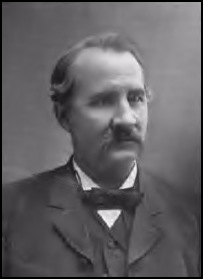 THOMPSON,
Judge William George, Judge of Marion, Linn
county, has borne a conspicuous part in the
affairs of the state since 1853. He was born in
Center township, Butler county, Pa., January 17,
1830. His father
was William H. Thompson, a farmer in comfortable
circumstances, who died at the age of 73 years.
He was a quiet, peaceable man, was six feet five
inches in height, weighed 240 pounds and
had no surplus flesh. He never had a lawsuit or
quarrel. Mr. Thompson's mother's maiden name was
Jane McCandless. The grandparents on both sides
were Scotch and Scotch-Irish, and emigrated to
western Pennsylvania in 1798. Both of Mr.
Thompson's parents were born and reared in
Center township, Butler county, Pa., and lived
and died there. In forty-five years of married
life Mrs. Thompson, mother of William G., was
never one night away from home. They were all
strict Presbyterians. THOMPSON,
Judge William George, Judge of Marion, Linn
county, has borne a conspicuous part in the
affairs of the state since 1853. He was born in
Center township, Butler county, Pa., January 17,
1830. His father
was William H. Thompson, a farmer in comfortable
circumstances, who died at the age of 73 years.
He was a quiet, peaceable man, was six feet five
inches in height, weighed 240 pounds and
had no surplus flesh. He never had a lawsuit or
quarrel. Mr. Thompson's mother's maiden name was
Jane McCandless. The grandparents on both sides
were Scotch and Scotch-Irish, and emigrated to
western Pennsylvania in 1798. Both of Mr.
Thompson's parents were born and reared in
Center township, Butler county, Pa., and lived
and died there. In forty-five years of married
life Mrs. Thompson, mother of William G., was
never one night away from home. They were all
strict Presbyterians.
William O. received his
early education in a log schoolhouse two and a
quarter miles from home, where he attended every
winter from the age of 7 to 17. He then began to
teach school, working on the farm in the
summertime. At the age of 19 he entered
Weatherspoon institute as a student for two
years, continuing to work on the farm during
harvest time, and then entered the law office of
Wm. Timblin, in Butler, Pa., as a law student,
keeping the office open and doing chores for his
board in the family of his employer. In two
years he fitted himself for admission to the
bar, and was given a certificate after thorough
examination by a committee, of which Judge
Daniel Agnew was chairman, October 15, 1853. A
little more than a month later, November 27,
young Thompson started for Iowa, not knowing
where he would locate. In Davenport he heard
about the promising little town of Marion and
went there in December without money, books or
acquaintances, but with good health and industry
and ability. He decided to stay, and has never
changed his location. His first dollar was
earned in about two weeks after locating by
attending to a suit before a justice of the
peace, and from that time on he has never lacked
a competence. His reputation as a lawyer extends
all over the state and he has won considerable
renown as a criminal lawyer, having defended in
twelve murder trials and lost but two of them.
He was in the famous Bever contested will case.
Judge Thompson has been a
leader in politics, and has always been a
republican. He was a delegate to the convention
at Iowa City February 22, 1854, which nominated
James W. Grimes for governor, and founded the
republican party. In 1854 he was elected
prosecuting attorney of Linn county, the first
republican ever elected in the county. At the
expiration of his term he was elected a member
of the state senate and was a member of the last
senate held in Iowa City and the first one in
Des Moines. He was presidential elector-at-large
in 1864, and with C. Ben Darwin as the other
elector-at-large, stumped the state and cast the
vote of the state for Abraham Lincoln, which he
says was the proudest act of his life. He was
then elected district attorney for the district
composed of the counties of Linn, Jones, Cedar,
Johnson, Iowa, Benton and Tama, and served six
years, declining another term. In 1879 he was
appointed chief justice of the territory of
Idaho by President Hayes, but declined to
accept, but being urged to do so by his friends
and members of congress he accepted long enough
to hold the term of court then provided for, and
in March, 1879, having completed the term,
resigned. In November, 1879, he was elected to
congress and in 1881 was re-elected. In 1886 he
was elected to the lower house of the
legislature and served two years. He was one of
the committee from the house that prosecuted
John L. Brown, auditor of state, before the
state senate, sitting as a court of impeachment.
In September, 1894, Mr. Thompson was appointed
judge of the Eighteenth Judicial district by
Governor Jackson, to fill the vacancy caused by
the resignation of Judge Preston, and was
immediately nominated and elected to that
office, which he still holds, and is now
re-nominated for second term. Judge
Thompson has never been defeated when a
candidate for office. His conspicuous ability
and vigorous character and innate honesty have
attracted people to him.
In 1862 Mr. Thompson was
commissioned major of the Twentieth Iowa
Volunteer infantry, and was in command of the
regiment for over a year. He was severely
wounded in the battle of Prairie Grove, Ark.,
December 7, 1862. He was at the siege and
capture of Vicksburg, and then went to Texas and
was present at the capture of Fort Aransas Pass.
A post was established there and Major Thompson
was put in command of the same, and so remained
until 1864, when he was honorably discharged
from the service. He is a member of the G. A. R.
Post of Marion, and is a member of the Loyal
Legion. Judge Thompson was married June 12,
1856, to Harriet J. Parsons, now deceased. They
had one child, John M. Thompson, born May 24,
1875.
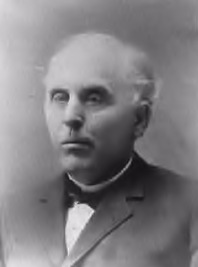 VAN
VECHTEN, Giles F. and Charles D., of Cedar
Rapids, have made that name known and honored
throughout that region. The name of Van Vechten
dates back in its origin to the time of Ceasar,
and is traceable to the name of an old Roman
camping place called Vectum (now Vechten) near
Utrecht in Holland. The name of
Van Vechten signifies from the fighting
place. VAN
VECHTEN, Giles F. and Charles D., of Cedar
Rapids, have made that name known and honored
throughout that region. The name of Van Vechten
dates back in its origin to the time of Ceasar,
and is traceable to the name of an old Roman
camping place called Vectum (now Vechten) near
Utrecht in Holland. The name of
Van Vechten signifies from the fighting
place.
The first of the family who
came to America, was Teunis Dirckaen Van
Vechten, who came to New Netherlands in the ship
"Arms of Norway," with his wife, one child and
two servants, and settled on a farm at Green
bush, opposite Albany, N. Y., in 1638.
Persons of this name are now found in nearly
every state of the union; but the Dutch habit of
continuity clings to the greater number, who
have remained near the home of their fathers in
New York. The family, however scattered or
mingled with the blood of other families, has
retained a remarkable resemblance in its
different members and has furnished its full
share of those who, in peace and war, have made
a history for this country.
The father of Giles Fonda
and Charles Duane Van Vechten, was Gilbert Van
Vechten, a farmer, of Lewis county, N. Y. Their
mother, Ilona Bent, came from New-England stock,
her father having been born in Templeton, Mass.
He removed, soon after his marriage, to Lewis
county, in northern New York, which was then a
dense forest, with only two families anywhere
near the place which became his home.
Giles F. was born in
Denmark, Lewis county, N. Y. August 6,
1827. He was educated in the district schools
and at Denmark academy. In 1854 he moved to
Milledgeville, Carroll county, 111., and engaged
in farming and stock raising. In 1865 he and
Henry G. Page, of Lanark, 111., opened the
private bank of Van Vechten & Page, in the
town of Lanark. He remained there for about ten
years, changing the bank meanwhile into the
First National bank of Lanark. In 1875 he sold
his interest in the bank and other property at
Lanark and soon after removed to Minneapolis,
Minn. In November, 1876, he came to Cedar
Rapids, where he has since resided, and opened
the private bank of G. F. Van Vechten.
In 1886 the bank was changed to the Cedar Rapids
National bank, of which he has since been
vice-president.
In 1889 he assisted in
organizing the Security Savings bank of which he
has since been president. Mr. Van
Vechten is naturally conservative, his ventures
have been along the line of safety, and his
business career has been in the best sense
successful. Passing through several panics, his
business methods have always been sufficient
defense against disaster, and the financial
institutions with which he has been connected
have never suffered failure. He has given
much of his time to the investment of funds
Intrusted to him for that purpose, and can
truthfully say he has never lost a dollar for
his clients. Although naturally a money-maker he
cares little for simply accumulating money, but
believes that men who occupy positions of trust
owe it to the community in which they live to
help others as well as themselves. He would, if
he could, give all men and women an opportunity
in the world and would guard them against
failure. Politically,
Mr. Van Vechten has, as a rule, acted with the
republican party, although he was never a
partisan. In his later years he has grown more
independent in politics and is a believer in the
justice of the doctrine known as the "Single
Tax."
He was married to Miss Emma
Melissa Humphrey on April 14, 1858. They have
had no children of their own. They have one
adopted daughter, Mary, who is now the wife of
Merritt W. Pinckney, a Chicago
attorney.
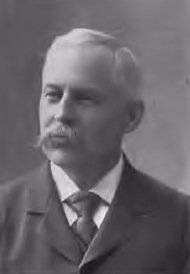 Charles
D. Van Vechten was born in Denmark, N. Y.,
September 4, 1889. At the age of 16 he went to
Battle Creek, Mich., where he attended school
for one year and then went to the Kalamazoo
schools for two years. Charles
D. Van Vechten was born in Denmark, N. Y.,
September 4, 1889. At the age of 16 he went to
Battle Creek, Mich., where he attended school
for one year and then went to the Kalamazoo
schools for two years.
When about 22 years old he
went into the general merchandise and lumber
business at Mattawan, Mich., about twelve miles
west of Kalamazoo, where he remained until 1876.
He then removed to Minneapolis, Minn , with his
brother, Giles F., and in February, 1877 came to
Cedar Rapids, where he has since resided. For
about seven years he acted as cashier of his.
brother's bank. In August, 1884, be was elected
secretary of the Cedar Rapids Insurance company.
In January, 1885, the stockholders of ibis
company placed it in liquidation on account of
losses which occurred prior to Mr. Van Vechten's
connection with It, and an arrangement was made
by which its risks were gradually reinsured in
the Continental of New York. He acted as
state agent for the Continental until January,
1888. In February, 1888, he accepted the
position of associate general agent in the
general agency of northern and western Iowa, for
the Northwestern Mutual Life Insurance company,
of Milwaukee. Although taking up insurance
business rather late in life his success has
been entirely satisfactory. Politically, he is
independent, al-though usually acting with the
republican party. He is a
believer in the "Single Tax." and is warmly
interested in other reform movements. The only
public office he ever held was that of alderman
for the fifth ward of Cedar Rapids.
August, 1861, he was
married to Ada Amanda Pitch. They have three
children: Ralph, born August 29, 1862, and
cashier of the Cedar Rapids National bank; Emma,
born June 11, 1867, and the wife of Clifford K.
Shaffer, of Cedar Rapids; and Carl, born June
17, 1880, who has recently completed the high
school course.
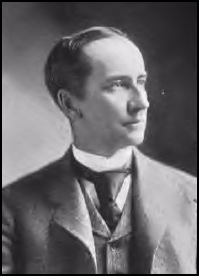 WILLIAMS,
Robert, is the son of Mr. Wareham
Williams, deceased, and Ellen Elizabeth Thacher,
now a resident of Norwich, Conn. His father was
engaged in the wholesale and retail dry goods
business and was prominently identified with
other commercial interests at Norwich, Conn., at
which place Robert Williams was born, July 11,
1852. He attended school at the Norwich Free
academy and then entered Yale university,
graduating from that institution in 1873.
Desiring to follow the footsteps of his father
and perfect himself in commercial pursuits, he
in 1874 sought and obtained a clerkship in the
Thames National bank of Norwich, Conn., without
salary, and he attended to the duties allotted
him there under these circumstances until June,
1875, when he secured the position of clearing
house clerk in the Continental National bank of
New York city, but was soon obliged to give it
up on account of his health. In August, 1875, he
moved to Cedar Rapids, Iowa, his present
homeland entered the service of the Burlington,
Cedar Rapids & Minnesota railway company,
under Gen. E. F. Winslow, receiver of that
company, as clerk for Mr. C. J. Ives,
then superintendent of the road. In 1879 he
was appointed purchasing agent, the company
being reorganized in the meantime as the
Burlington, Cedar Rapids & Northern railway
company. In 1881 he was made assistant
superintendent, and in 1882 promoted to the
position of superintendent of the road in charge
of the operating department; in 1884 he was
elected vice-president of the company, and in
1894 he became its general superintendent, now
holding both these positions. WILLIAMS,
Robert, is the son of Mr. Wareham
Williams, deceased, and Ellen Elizabeth Thacher,
now a resident of Norwich, Conn. His father was
engaged in the wholesale and retail dry goods
business and was prominently identified with
other commercial interests at Norwich, Conn., at
which place Robert Williams was born, July 11,
1852. He attended school at the Norwich Free
academy and then entered Yale university,
graduating from that institution in 1873.
Desiring to follow the footsteps of his father
and perfect himself in commercial pursuits, he
in 1874 sought and obtained a clerkship in the
Thames National bank of Norwich, Conn., without
salary, and he attended to the duties allotted
him there under these circumstances until June,
1875, when he secured the position of clearing
house clerk in the Continental National bank of
New York city, but was soon obliged to give it
up on account of his health. In August, 1875, he
moved to Cedar Rapids, Iowa, his present
homeland entered the service of the Burlington,
Cedar Rapids & Minnesota railway company,
under Gen. E. F. Winslow, receiver of that
company, as clerk for Mr. C. J. Ives,
then superintendent of the road. In 1879 he
was appointed purchasing agent, the company
being reorganized in the meantime as the
Burlington, Cedar Rapids & Northern railway
company. In 1881 he was made assistant
superintendent, and in 1882 promoted to the
position of superintendent of the road in charge
of the operating department; in 1884 he was
elected vice-president of the company, and in
1894 he became its general superintendent, now
holding both these positions.
He is in private life of a
quiet and retiring disposition, taking much of
his social pleasure from the surroundings of his
home and in the company of friends with whom he
has been intimate for years. In business
matters he is both active and energetic, and
pursues all of his duties in that conscientious,
earnest manner peculiar to those who have
inherited the sturdy traits of a vigorous New
England ancestry. He is noted
in railway circles for the tenacious way in
which he adheres to the principles of fairness
and justice in the management of the affairs of
the company he has been so closely identified
with for the past twenty-three years. As the
Burlington, Cedar Rapids & Northern Railway
company is recognized and stands in Iowa,
Minnesota and South Dakota, the three states in
which its line is located, as the embodiment of
fair and reasonable business principles, it can
be fairly said that our Mr. Williams bears the
same relationship to the company as far as these
qualifications are concerned, as it does to the
business interests of the states through which
its system extends. He has always been a
republican in politics, but cannot be considered
a partisan in the strict sense of the word.
He was married in May,
1888, to Miss Mary Foster Bard, of Norwich,
Conn. They have one
daughter, Ellen Elizabeth, born July 21,
1892.
The information
on Trails to the Past © Copyright
may be used in personal family history research,
with source citation. The pages in entirety may
not be duplicated for publication in any fashion
without the permission of the owner. Commercial
use of any material on this site is not
permitted. Please respect the wishes of
those who have contributed their time and
efforts to make this free site possible.~Thank
you! | |
|
|
| |
|